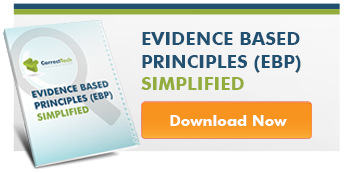This is the 2nd of a 7 part series on The Risk Principle Simplified. Subscribe to our blog and get the series delivered right to your inbox.
Why Does it Need to be Objective?
“Objective” means not influenced by personal feelings, interpretations, or prejudice; based on facts; unbiased. Prior to the use of objective measures of risk, subjective assessment was used. Subjective assessment of risk is based on a review of the clients’ history and a verbal interview with the individual about their plans and attitudes. In other words, subjective assessment is based on instinct or “gut” and therefore more reflective of the evaluator’s biases and/or the likeability of, or the effective manipulation by, the offender. Objective assessment accomplishes two things:
- Appropriate Focus: In order to measure the likelihood of criminal behavior, we must focus on the criteria that actually led to crime. Risk assessment is helpful only if you are measuring the presence and/or absence of characteristics that actually correlate with criminal behavior. For example, since research has proven that low self-esteem does not predict crime,







